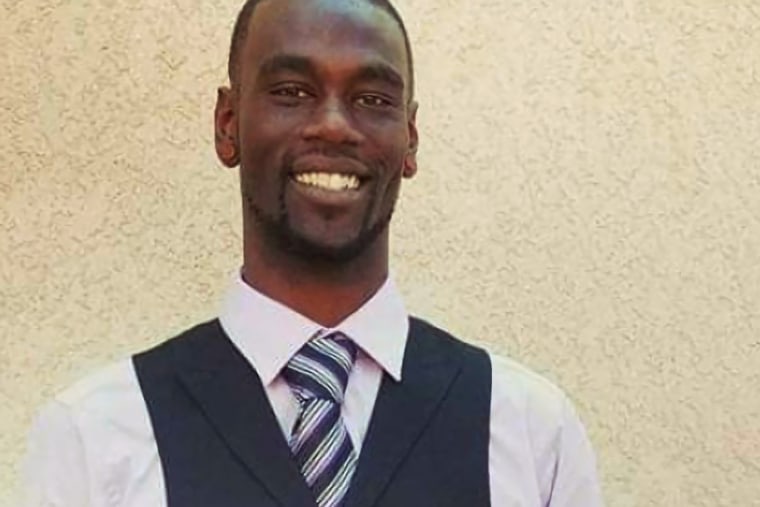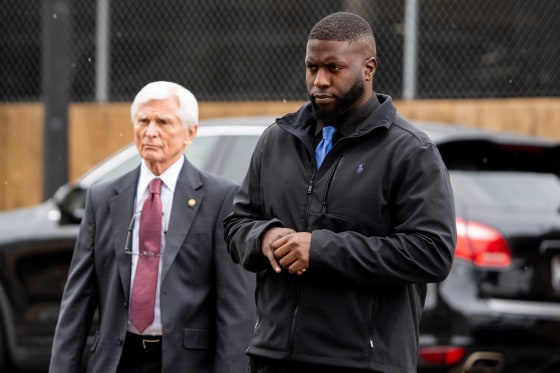MEMPHIS, Tenn. — A former police officer testified Tuesday that he removed his body camera after he punched Tyre Nichols at least five times and kicked him four times.
“I didn’t want it to show what we were doing," Emmitt Martin III told a federal jury in the trial of three former officers charged in the beating of Nichols, who died three days later.
Martin, who initiated the traffic stop against Nichols, said in federal court Monday that Nichols never posed a threat and that officers downplayed their own actions during the encounter on Jan. 7, 2023, which led to Nichols’ brutal beating.
Martin, who has already pleaded guilty, said that Nichols ran away shortly after he was pepper-sprayed but that he caught up with him. Several officers were already there.
“I ran in and assisted, and I kicked him,” Martin told the court, adding that his actions were deliberate and inconsistent with Memphis police policy.
“I was angry. ... I was already angry that he ran from the first stop," Martin said, referring to the traffic stop that set off the encounter.
Martin said he punched Nichols at least five times and kicked him four times and then stood by and watched former officers Justin Smith and Tadarrius Bean beat Nichols.
Martin said he lied to a supervisor that Nichols was high and threw a punch at him.
Martin said in court that his punches were deliberate and inconsistent with Memphis police policy and that they did not serve a legal purpose.
He added that Nichols was "helpless."
Martin said that when former officer Desmond Mills Jr. began hitting Nichols with a baton, he moved out of the way without offering help.
He said it was standard for members of the Memphis Police Department's anti-violence team to keep quiet about using force.
Martin testified for a second day after he told the court Monday that police officers violated protocol when they used excessive force and that Nichols never posed a threat during the encounter.
Martin testified he was angry that night because he hadn't yet made an arrest, but then he noticed Nichols driving a little fast as a traffic light was turning red and saw him changing lanes without signaling.

Although a check of Nichols' license plate number indicated that there were no warrants for his arrest and that he was not a violent offender, Martin radioed fellow members of a police anti-violence unit on a private channel that they needed to make a felony stop.
“Because I exaggerated what he had done … and it escalated,” Martin said, adding that officers violated protocol by pursuing a nonviolent offender.
Bean, Smith and Demetrius Haley have pleaded not guilty to charges that they deprived Nichols, 29, of his rights through excessive force and failure to intervene and that they obstructed justice through witness tampering.
Martin, the first former officer to testify at their trial, and Mills have pleaded guilty to the federal charges.
All five were fired for violating police department policies. They had been members of a crime suppression unit called Scorpion, or Street Crimes Operation to Restore Peace in Our Neighborhoods, which was disbanded after Nichols’ death.
Martin, nicknamed "Full Can" by colleagues after he once used an entire can of pepper spray on a suspect, testified it was his first week back on the job after he had been off for about six weeks because he was struck by a car while working.
Asked by prosecutor Kathryn Gilbert how he felt about returning, Martin responded: “I was nervous. I wanted some kind of revenge. I was seeing red.”
Martin said that after Nichols was stopped, Haley brandished his gun and told Nichols to “get the f--- out of the car.” Martin then pulled out his gun before Haley snatched Nichols from the car.
Nichols, who was Black, died in a hospital three days after he was kicked, punched and hit with a police baton during the traffic stop.
Harrowing video showed Nichols being beaten with batons, pepper-sprayed and kicked in the face while calling for his mother about a block away from home.
The fatal encounter reignited calls for police reform and charges against the officers.
An autopsy report said Nichols' death was a homicide caused by blows to the head that resulted in brain injuries and cuts and bruises.
Rebecca Byrd reported from Memphis and Deon J. Hampton from Denver.
